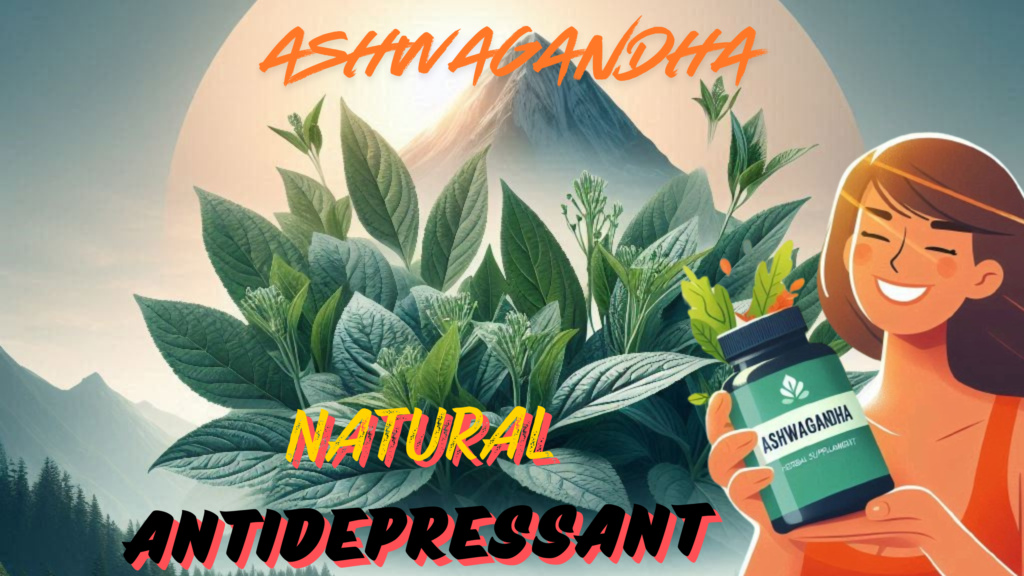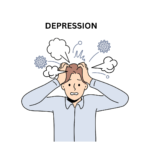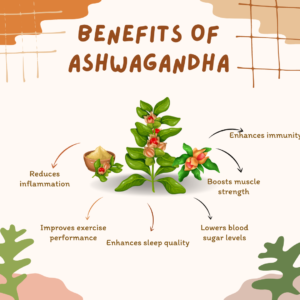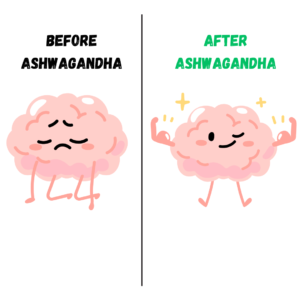“He who has health has hope, and he who has hope has everything.”
Let's discover The Miraculous Benefits of Ashwagandha as a Natural Antidepressant.

Introduction:
Feeling scared by the side effects of stress or depression medication? Break free with nature’s remedy: Ashwagandha, a powerful natural antidepressant. Ready to experience the healing touch of Mother Earth?
Ashwagandha , also known as Withania somnifera, is the king of natural herbs. Often referred to as “Indian ginseng,” it has been a staple in Ayurvedic medicine for centuries.
Table of Contents
Rise of Herbal Medicine for Depression:
Over the past two decades, treating depression with herbal medicine has grown in popularity worldwide. A 2018 analysis found that 45% of studies on herbal medicines for depression and anxiety reported positive results with fewer side effects compared to conventional medications.
Many people have benefited from herbal medicines where conventional treatments have failed. Ashwagandha is one such as a natural antidepressant that mimics the effects of conventional antidepressants without the side effects.

Why Ashwagandha is Popular as a Natural Antidepressant?
- The increase in popularity of Ashwagandha as an natural antidepressant is due to its adaptogenic, anti-stress, and anti-inflammatory properties.
- In Ayurveda, it is used as a Rasayana herb to rejuvenate the body by maintaining the health of body tissues. Its reputed properties include the ability to improve concentration, memory, and mood.
- Ashwagandha helps reduce glucocorticoids and modulate the immune system, the main stress hormones. Both its root and leaf are effective, but the root is particularly beneficial for mood stabilization and treating depression and anxiety.
Understanding Depression:
- Depression is a brain disorder that causes significant emotional suffering and negatively affects physical health, impacting everything from the heart to immunity.
- Common physical symptoms include severe fatigue, decreased interest in sex, appetite changes, insomnia, and more.
- Conventional medications for depression can have significant side effects, such as appetite loss, headaches, and weight gain.
But now no more stress and depression as we can use ashwagandha as a Natural Antidepressant without any side effects.

Ashwagandha: A Natural Solution:
- Research has shown Ashwagandha as a Natural Antidepressant, with its ability to boost mental and physical health during stress.
- Long-term use of Ashwagandha reduces cortisol levels and adrenal hormone secretions, helping manage stress and depression effectively.

Benefits of Ashwagandha:
- Reduces inflammation
- Improves exercise performance
- Enhances sleep quality
- Lowers blood sugar levels
- Boosts muscle strength
- Enhances immunity

The Science Behind Ashwagandha as a Natural Antidepressant:
- Ashwagandha, an adaptogenic herb, helps resist the damaging effects of stress and restores normal physiological functions. By reducing cortisol levels, it alleviates stress, improves mental health, sleep quality, and metabolism.
- It regulates the release of adrenocorticotropic hormone (ACTH) from the pituitary gland and cortisol from the adrenal glands, promoting relaxation and reducing anxiety.

Personal Experiences:
- Users report improvements in overall health, mental clarity, sleep quality, increased testosterone in men, and higher energy levels.
- Some have found relief from PMS symptoms like fatigue and mood swings.
- Users feeling better naturally with Ashwagandha as a Natural Antidepressant.
Comparative Analysis: Ashwagandha vs. Antidepressants.
- Effectiveness: Ashwagandha as a natural antidepressant reduces stress, anxiety, and depression by lowering cortisol levels, while antidepressants alter neurotransmitters to improve mood.
- Time of Action: Ashwagandha may show effects within a few days, whereas antidepressants typically take 4-6 weeks.
- Side Effects: Ashwagandha has minimal side effects, primarily digestive issues in high doses. Antidepressants often have more severe side effects, such as weight gain and sexual dysfunction.
- Additional Benefits: Ashwagandha offers a wide range of health benefits beyond mood enhancement, unlike antidepressants.
- Long-term Use: Ashwagandha is suitable for long-term use with a low risk of dependence, whereas antidepressants can lead to dependency.

Integrating Ashwagandha into Your Wellness Routine:
- Ashwagandha is available in powder, tablet, or capsule form. Tablets and capsules help control dosage, while powder can be mixed with smoothies, teas, or milk. Ensure high-quality Ashwagandha by choosing root extracts, avoiding alcohol-based extractions, and verifying withanolide content.
Recommended Dosage:
- Tablets: 1 tablet twice daily with milk or water after meals.
- Capsules: 1 capsule twice daily with milk or water after meals.
- Powder: 1/4–1/2 teaspoon twice daily with milk or honey.
Who Should Avoid Ashwagandha:
- Pregnant or breastfeeding women
- People with liver or stomach ulcers
- Those about to undergo surgery
- Individuals with autoimmune diseases and thyroid disorders
Note: Always consult your healthcare provider before starting Ashwagandha.
Conclusion:
Ashwagandha as a Natural Antidepressant, with its adaptogenic properties, effectively reduces stress, anxiety, and depression by regulating cortisol levels. It offers a natural alternative to antidepressants, with additional benefits like improved sleep, increased energy, and enhanced muscle mass. Always seek advice from a healthcare practitioner before incorporating Ashwagandha into your routine.
I am sure you got the complete guide about ashwagandha as a natural antidepressant.
NOTE:
All the information provided above is intended for informational purposes only. Please consult your healthcare provider before incorporating Ashwagandha or any other supplement into your wellness routine, especially if you have underlying health conditions or are taking other medications
- FAQ
Ashwagandha, also known as Withania somnifera or Indian ginseng, is an adaptogenic herb traditionally used in Ayurvedic medicine to reduce stress, enhance mental clarity, and improve overall health.
Ashwagandha works as a natural antidepressant by reducing cortisol levels, which helps manage stress and anxiety. Its adaptogenic properties help balance neurotransmitters in the brain, promoting a sense of calm and well-being.
Benefits of using Ashwagandha for depression include reduced stress and anxiety, improved mood, better sleep quality, increased energy levels, and enhanced mental clarity. It also has fewer side effects compared to conventional antidepressants.
Ashwagandha is generally well-tolerated, but some people may experience mild side effects such as stomach upset, diarrhea, or drowsiness. It is advisable to consult a healthcare provider before starting any new supplement.
Ashwagandha can be taken in various forms, including capsules, tablets, or powder. The typical recommended dosage is 1-2 capsules or tablets per day, or 1/4 to 1/2 teaspoon of powder twice daily, with water or milk. Always follow the dosage instructions on the product label or consult a healthcare provider.
Some users may start to notice the effects of Ashwagandha within a few days, while for others, it may take several weeks of consistent use. Generally, it takes about 2-4 weeks to experience significant benefits.
It is important to consult with a healthcare provider before combining Ashwagandha with other medications, especially if you are taking antidepressants, immunosuppressants, or medications for thyroid conditions.
Yes, Ashwagandha is considered safe for long-term use when taken at recommended dosages. However, it is always best to consult with a healthcare provider for personalized advice.
Yes, Ashwagandha has been shown to help reduce symptoms of both anxiety and depression due to its adaptogenic properties, which help the body manage stress more effectively.
Pregnant or breastfeeding women, individuals with autoimmune diseases, thyroid disorders, or those about to undergo surgery should avoid taking Ashwagandha unless advised by a healthcare provider.

Great information
Pingback: Ashwagandha Skincare Benefits: Unlock the Secret to Glowing Skin